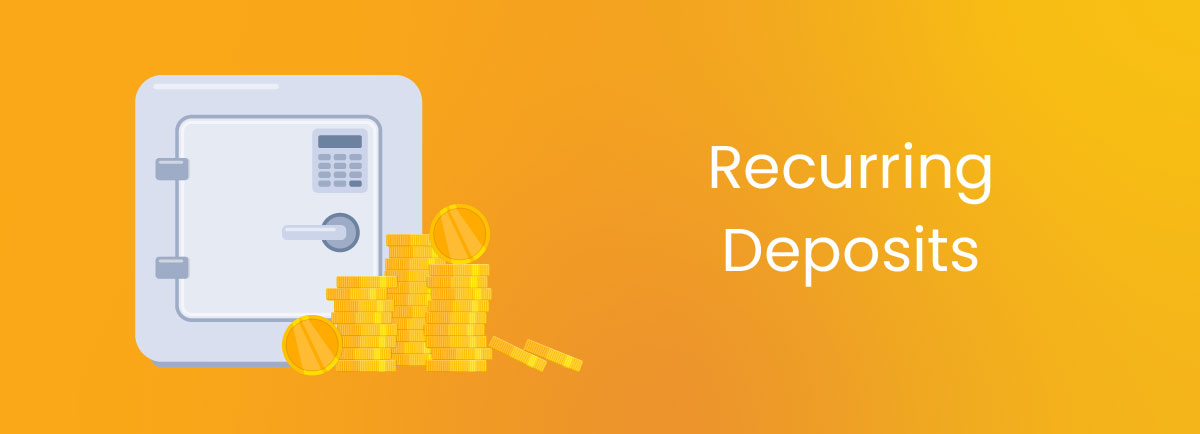
Facts About Recurring Deposits You Need to Know
11 June 2024 | By INDIE
People are always finding profitable methods to keep a share of their income aside as a backup for emergencies. Every month, you may try to save some money for the rainy days, but if unforeseen expenses emerge out of nowhere, all the savings plans get derailed.
What you need is the discipline of depositing regular investments, either from your salary or other income sources. The rewards can pile up into multiples of your investment amount as you earn interest over time. You must look into recurring deposits (RDs) to keep your savings journey intact.
Besides protecting the invested amount, the extra money earned through compound and standard interest makes recurring deposits an attractive investment tool. Investors like you can combine the safety of fixed deposits (FDs) with the flexibility of saving smaller amounts at regular intervals.
Is RD good? It definitely is! We’ve highlighted some facts about this investment tool below.
6 Truths About Recurring Deposits Every Investor Must Know
Here are six facts about recurring deposits to know in your mission against financial unpredictability:
1. No Need for One-Time Lumpsum Deposits
RDs don’t demand single-time lump sum deposits into your account. Investors are free to pump in monthly deposits for a pre-decided period. This relieves low-income investors from the stress of FD systems.
You can kickstart your RD account with amounts as small as 500 INR and prevent the issue of hefty deposits.
2. Interest Rates Won’t Fluctuate
Firstly, the rates of interest that banks offer for RDs and FDs are similar. Though FD may have a slightly higher interest rate, the flexibility and same-interest guarantee for RDs is attractive.
Even better, the initial interest rate offered on your RD stays constant and is not subject to change. This allows RD account holders to keep the uncertainty of specific returns at bay.
3. Senior Citizens Receive a High Rate of Return
One standout fact about RDs is the privilege of higher interest rates given to senior citizens. This variance in interest rates is typically 0.5% or greater in comparison to what non-senior citizens receive.
This benefit makes RDs a great long-term choice for your elderly family members since they can access these funds during emergencies.
4. RDs Deduct TDS on a Conditional Basis
There is a misconception that RD account holders are not charged TDS on the maturity of their investments. Factually, RDs are liable to pay Tax Deducted at Source (TDS).
Remember, many banks don’t hold TDS facilities for RD accounts.
The condition states that you’ll be charged 10% TDS if your interest amount is over 40,000 INR. This threshold value is 50,000 INR for senior citizens. Note that the exemption of TDS for investors earning under 40,000 INR is in the best interest of low-income investors.
5. Enjoy Variable Deposit Limit
RDs permit investors the freedom to choose between very low, intermediate, or high monthly deposit amounts.
Keep in mind that you cannot deposit more than two crore INR into your RD account. At the same time, RD account holders have the liberty to deposit flexible amounts across equally flexible tenures.
6. RDs Work Best for Salaried Individuals
Considering the repeated nature of monthly installments in RDs, this investment instrument suits salaried people more than those with an irregular income.
This suitability is further enhanced since RDs are low-risk investment options. You can play it safe and design an RD investment strategy tailored to your financial condition and expected income inflow.
Eligibility Criteria to Apply for Recurring Deposit Accounts
Here are a few eligibility criteria when applying for recurring deposits:
- Minors above 10 years of age
- Minors below or equal to 10 years of age via a legal guardian
- Individual and or non-individual accounts can apply
- Corporate organizations
- Government organizations
- Application form, passport-size photos, identity and address proof, KYC documents
Also Read: Flexi Fixed Deposit vs Regular Fixed Deposit (Features and Benefits)
Disclaimer: The information provided in this article is generic and for informational purposes only. It is not a substitute for specific advice in your circumstances. Hence, you are advised to consult your financial advisor before making any financial decision. IndusInd Bank Limited (IBL) does not influence the views of the author in any way. IBL and the author shall not be responsible for any direct/indirect loss or liability incurred by the reader for making any financial decisions based on the contents and information.




